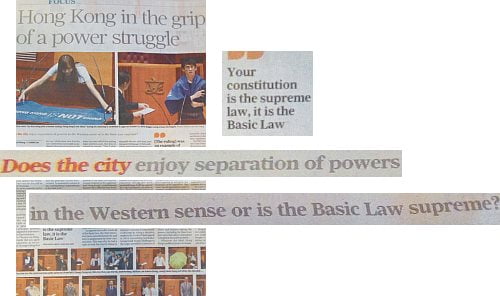The South China Morning Post sets readers’ hearts pounding with a racy headline about ‘Hong Kong in the grip of a power struggle’. Disappointingly, it is not about blood flowing in the corridors of Government House or the Liaison Office. The full-page feature examines whether the city has separation of powers.
You can tell the paper isn’t going to answer the question properly by the way it adds ‘in the Western sense’, as if there are regional varieties of the principle. While the details differ in in every country, it’s ultimately the same thing anywhere on the planet: constitutionalism as a way to limit the power of government.
The article focuses on the Hong Kong courts’ intervention in the Youngspiration Oath-Gate saga, which is topical but arguably doesn’t help answer the question. It also gets sidetracked with some meaningless comparisons (the UK’s parliamentary sovereignty vs Hong Kong’s feeble Legislative Council). The main problem – as with most analyses of this subject in Hong Kong – is that the SCMP seeks the truth from the Basic Law.
Hong Kong’s ‘mini-constitution’ is an understandable place to look. The law was drafted in the 1980s-90s by Beijing and Hong Kong representatives, and passed by the Chinese legislature, and implicitly enshrines the UK-China deal for the 1997 handover. And it spells out the separate roles of the three branches of government, including a clear requirement for an independent judiciary. So far, so good. This impression is bolstered by the fact that – most of the time – we see separation of powers in action on a daily basis.
Yet the SCMP article also refers to the Basic Law as evidence that Hong Kong does not have separation of powers. It quotes a Professor Song Xiaozhuang of Shenzhen as saying as much – or at least that separation of powers exists only insofar as the Basic Law enables it. (Similar apparent confusion appears here.) In the picture that is emerging, Hong Kong has serious, gleaming separation of powers if you look from the bottom up, but it’s a shabby and dispensable foreign object when you look at it from the top down.
There is a simple answer to the question – but you won’t get it from the SCMP, or the government, or even the lawyers’ associations, mainstream pan-democrats or civil rights activists. It goes back to that word ‘constitutionalism’.
You wouldn’t ask whether China has freedom of the press, and then look to the Chinese constitution for the answer. That’s because you know China’s constitution is fake. The Communist Party has supreme control, and the legislature, judiciary (and media, academia, churches, etc) are all tools of executive power. Laws in China mean whatever the regime wishes on the day. This includes ‘our’ Basic Law, hence the ‘interpretation’ system that can change the document’s meaning in a minute.
Since the Communist Party must have a monopoly of power, it follows that a sub-national tier of government cannot have genuinely independent branches. Thus Hong Kong’s Chief Executive is chosen by Beijing (via fake ‘election’); the composition of the city’s weak legislature is rigged so Beijing can override it if needed (the current purge of localists is consolidating this control); and Basic Law ‘interpretation’ can render the local courts powerless as necessary.
The pro-Beijing camp tend to dress this up in ‘constitutional’ language, gravely referring to Basic Law articles as if they are carved in stone. Traditional pan-dems and lawyers take comfort in going along with this. But we all know that a Mainlander who writes an essay suggesting that the Chinese government obey its own constitution gets 11 years in prison.
So the answer to the question is: No, Hong Kong cannot have separation of powers, as the principle is incompatible with a one-party Leninist system designed to keep a corrupt and brutal regime in power at any cost. The SCMP could have saved almost a full page.
Only the localist-radical-separatist outcasts get this, or are willing to put it in such plain language – but maybe they are the first to find out for sure the hard way.
I declare the weekend open with good news from Pacific Coffee for pescetarians, the tired-of-sushi and other adventurous eaters…
The ‘SNAPS’ is presumably a warning.



Chinese democracy for all to see:
http://www.bbc.com/news/world-asia-38005603
These thugs (police? same) remind me of those fleets of Chinese fishing boats, all lashed together, steaming over hapless coastguard vessels (sink one Indonesia – oh PLEASE!).
But nothing about another pair of bookshops closing.
Books are like kryptonite to Philistines. Maybe that explains it.
And what are you doing poring over an SCMP article. It’s like reading a sauce bottle.
Other cities have culture. We have entertainment. They have newspapers. We have the SCMP. If the SCMP were run like a business instead of subsidized as a propaganda sheet, it would have closed in 1995. So why are you sill reading it?
The bbc link is a taste of what HK seems to be heading for. The brown nosers and useful idiots are in for a nasty shock when it also starts happening to them, and they will not be able to count on the rule of law to protect them, as they will, ironically, have been instrumental in its demise.
There no such things as Chinese law or a lawyer. They’re oxymorons. It’s just politics and propaganda by a different label.
One Grey November Afternoon
Slow, slow, slow beats the funeral drum
And sad, sad, sad the mourners come.
In faded red – patriots misguided
Colourless – democrats divided
Red, white and blue – expats once deluded
Fresh and green – radicals excluded
All in brown – shoe-shiners crawling
Grave and grey – judges falling
In sombre black – lawyers vocal
Over-bright – youngsters local.
Heavy, heavy, heavy is the solemn past;
Lay it in its tomb, it could not last.
Under grey November clouds, the priest laments,
“Farewell to the musty documents.
Let them moulder, let them vanish in the haze.”
And everybody (insincerely) prays,
“Ashes to ashes, dust to dust.
In the Basic Law we trust.”
The 3 stages of the British China Hand:
1. Failed in London Try Hong Kong (FILTH)
2. Penniless Again Now Trying Shanghai (PANTS)
3. Back In London, Liver Yellow (BILLY)
http://dangerousminds.net/comments/bleak_paintings_that_portray_the_daily_challenges_of_being_human
Seems as appropriate to both sides of Lowu as it does Japan.